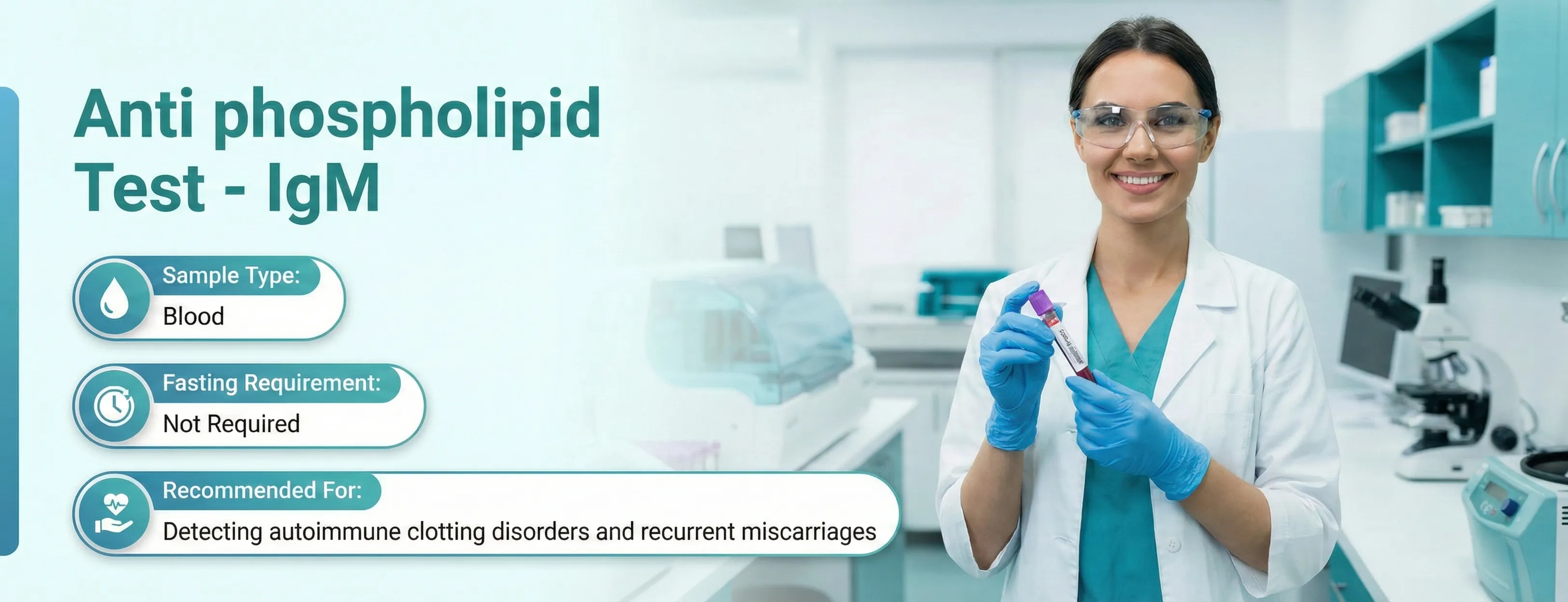22+ orders placed in your location
100% NABL & ISO Certified Lab • 100% Accurate Reports
Anti phospholipid Test - IgM
Antiphospholipid antibodies test, Antiphospholipid antibody panel, APL IgM antibodies, APS antibodies, Antiphospholipid IgM test, APLA IgM test
- SummaryThe Anti-Phospholipid IgM Test detects IgM antibodies against phospholipids, which are associated with autoimmune conditions like antiphospholipid syndrome. It is commonly used to investigate unexplained blood clots, recurrent miscarriages, or autoimmune symptoms. This test requires a blood sample, does not require fasting, and is suitable for all age groups and genders, based on a doctor’s recommendation.Read more
- Reports Within33 HrsView Sample Report100% NABL & ISO Certified Labs
- SampleBlood
- AgeAll Age Group
- GenderMale and Female
- FastingNot Required
PharmEasy Promises
Know More About The Test
A quick info on Anti phospholipid Test - IgM
Overview
The human body is made up of cells. Each and every cell of our body is surrounded by a cell membrane. The membrane has phospholipids in it. These phospholipids play an important role in maintaining cell functions. They allow movements of substances in and out of the cells. In certain conditions, our body starts producing antibodies against these phospholipids. The phospholipid antibodies attack the phospholipids and disrupt cell function. This is seen in a medical condition, Antiphospholipid Syndrome (APS).
The APS is an auto-immune disorder that means the immune system mistakenly destroys its body cells by making antibodies against them. Different types of antibodies are developed against phospholipids. Among them, the major antibodies are Anti-cardiolipin, Beta-2 Glycoprotein 1 antibody and Lupus anticoagulants. The Antiphospholipid Test measures the antibodies against phospholipids present in the blood.
There are three subclasses of these antibodies: IgG, IgM and IgA. Antiphospholipid IgG and Antiphospholipid IgM are more commonly tested. The Antiphospholipid IgM Test is done to measure the IgM subclass of phospholipid antibodies.
These phospholipid antibodies prevent the proper flow of blood. This results in the formation of blood clots. The blood clots, through the blood circulation, can be carried to the lungs, heart, kidney or brain. They can cause strokes, heart attacks, pulmonary embolisms, kidney damage and miscarriages.
Symptoms of antiphospholipid vary as they depend on the organ that is affected by the blood clots. Major symptoms that indicate the formation of antiphospholipids in the body are shortness of breath, migraine, persistent headache, heart attack, frequent unexplained blood clots, recurrent miscarriages and stillbirth. The APS is seen associated with genes, infections like syphilis, HIV, certain medications like penicillin and phenytoin and auto-immune diseases like Lupus Erythematosus.
As per the studies, the prevalence of Antiphospholipid Syndrome varies in different geographical regions. It is affected by ethnic differences and genetics. It is more common in the African region than in the Asia and Indian subcontinent. These antibodies can affect both men and women, but it is most commonly seen in women and elderly people. The disease can be life-threatening and its diagnosis followed by the proper medical treatment is important.
Risk Assessment
Antiphospholipid syndrome, Lupus erythematosus, excessive clotting disorder, Deep vein thrombosis
What does this test detect?
The Antiphospholipid IgM Test shows the presence or absence of antiphospholipid IgM in the blood. The ApL IgM test also measures the level of these IgM antibodies.
Indications for Anti phospholipid IgM Test
If a person is experiencing the following conditions, a healthcare practitioner may prescribe the APL test:
- Repeated headaches or migraines
- Pain, swelling and discolouration in legs
- Breathing difficulties
- Failure of in-vitro treatment
- Rashes on skin
- Bleeding from nose and gums
- Chest pain
- Increase in heart rate
- Stillbirth
- Recurrent miscarriages (especially during 2nd and 3rd trimester of pregnancy)
- Premature labour
Some disease conditions for which an Antiphospholipid IgM Test can be prescribed are:
- Autoimmune disorders
- Unexplained prolonged Prothrombin time(PT) test
- Venous and arterial thrombosis
- Low platelet count
- HIV/AIDS infection
- Lupus erythematosus
- Syphilis
- Lyme disease
- Stroke
- Heart attack
- Pulmonary embolism
- Kidney diseases
If the antibodies are present at a higher level, the test is repeated after 12 weeks. The result of the confirmatory test, along with the symptoms of the patient, helps in the diagnosis of underlying health conditions.
The Antiphospholipid IgM Test is applicable for both males and females. Certain medications like procainamide, penicillin and phenytoin may interfere with the test results. If you are on medication or ongoing any medical treatment, tell your doctor about it before taking the test.
How frequently should you take this test?
The APL IgM Test is prescribed by the consulting physician. The doctor may ask you to get tested if you have unexplained prolonged clotting time, meaning your blood is taking too much time to form the clot. The doctor may also prescribe the APL IgM test to women with recurrent miscarriages and stillbirth.
The antiphospholipid IgM is used to determine the IgG and IgM types of antibodies. If the APL IgM test results come positive, then it is repeated after 12 weeks. It is to determine whether the antibodies are persistent or temporary.
Test Preparation
Before the Test
Before undergoing the Antiphospholipid IgM Test, it is unlikely that your doctor will require you to take any special precautions. However, if you are to take this test with another one that requires special preparation, your doctor may suggest fasting for a specific time. Always speak with your doctor before a test.
During the Test
For the Antiphospholipid IgM Test, the phlebotomist will take a blood sample from your arm. Here's what will happen during the test:
- The likely puncture site will be sterilised with antiseptic.
- A tourniquet will be secured around your arm to make your veins stand out.
- A needle will be inserted into a chosen vein to draw the blood. This may cause a brief pinch for a few seconds.
- The blood will be collected in a vial/small test tube, and a label will be affixed with your details.
After the Test
Following the blood collection:
- A bandage will be placed over the insertion site to stem any bleeding.
- Bruising can happen. If you feel lightheaded (an uncommon side effect), you may be advised to rest for a few minutes.
- In case of persistent bleeding, pain, or rashes at the puncture site, contact your doctor.
Parameters
The APL IgM Test parameter includes the presence or absence of antiphospholipid IgM in the body. Different types of antibodies are produced by our immune system against phospholipids. Among them, levels of these antiphospholipids are measured to get the diagnosis correctly:
- Anticardiolipin IgM antibody
- Beta-2 glycoprotein IgM antibody
- Lupus anticoagulant
They are expressed as units/mL of blood. The result of the APL IgM Test shows the level of antibodies present at the time of the test. It can also be due to any infection. Your consulting doctor will explain the diagnosis and test results. The test result is affected by the health status of the person, recent infection, syphilis, HIV/AIDS infection and use of medications like penicillin.
The result of the APL IgM Test can be expressed as positive or negative. A second test after 12 weeks is advised to confirm the diagnosis along with other tests.
Ranges
|
Antiphospholipid antibody IgM Range |
Interpretation |
|---|---|
|
0.0-10.0 MPL units/ml |
Normal |
|
Anticardiolipin IgM Range |
Interpretation |
|---|---|
|
<15 U/ml |
Normal |
|
15-40 U/ml |
Weakly positive |
|
>40U/ml |
Positive |
|
Beta-2 glycoprotein IgM antibody Range |
Interpretation |
|---|---|
|
<20 SMU U/ml |
Normal |
|
>20 SMU U/ml |
Positive |
|
Lupus Anticoagulant IgM Range |
Interpretation |
|---|---|
|
20-39 MPL unit |
Normal |
|
>40 MPL unit |
Positive |
If its level is high and the test result is positive in pregnancy, there is a risk of miscarriage and premature labour.
The normal values and reference ranges of the test may vary from lab to lab. Please refer to the ranges mentioned in the report and consult a doctor to understand the interpretation of lab reports.
Test Result Interpretation
The test result is not significant in the diagnosis of any health condition. They are examined along with other test results, health status, signs and symptoms of the person.
- A negative result means you don’t have antiphospholipid antibodies.
- A positive result means you have antiphospholipid antibodies in the blood. A repeat test after 12 weeks will confirm it.
- If in the repeat test, the result is positive, it confirms the presence of some serious health issues.
- If the raised level of antibodies is not much, it indicates the presence of a recent infection. Moderate or high levels of any of the above-mentioned antibodies for more than 12 weeks show autoantibodies and risk of antiphospholipid syndrome.
The test alone cannot lead to any diagnosis. The doctor may prescribe other tests according to the signs and symptoms. Antiphospholipid syndrome has no cure. You can only prevent the formation of blood clots in future and with proper medical care, prolong the life of a person.
Risks and Limitations
The Antiphospholipid IgM Test, a commonly performed blood test, carries very few risks of complications. Consult your physician if you experience:
- Persistent bleeding at the puncture site
- Redness, swelling, or pain at the needle insertion site.
Limitations of the test
- Potential inaccuracies due to equipment malfunction or human error
- Misinterpretation of markers which may lead to an inaccurate reading and report.
Was This Test Information Helpful?
Please rate your experience
References
People Also Ask
What does a positive Anticardiolipin IgM mean?
How do you test for phospholipids?
Why do we test phospholipids?
Does antiphospholipid syndrome cause fatigue?
Popular Tests
Have any doubts? Ask us.
Ask us anything about the Anti phospholipid Test - IgM to understand it better
We provide trusted, expert-curated health content to support better awareness,prevention, and care.
Backed by experienced doctors, medical experts, and strict editorial standards.


